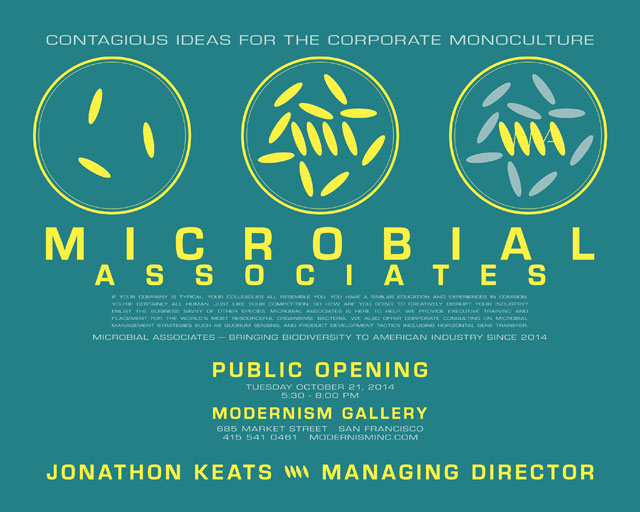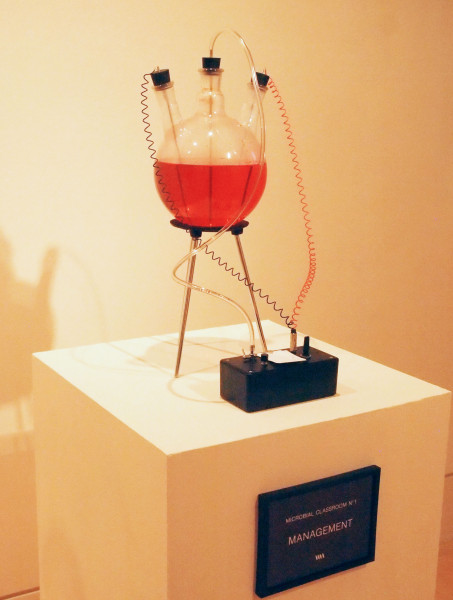It wasn’t clear that Mark Zuckerberg was going to show up, but Jonathon Keats was hopeful. Tuesday night was the launch of Microbial Associates, the world’s first corporate training academy for microbes.
With Silicon Valley companies struggling to add diversity to their workforce and otherwise stay competitive in the rapidly evolving global marketplace, Keats saw an opening. The industry is hungry for disruptive technologies, so why not train and certify bacteria to join the workforce and bring their skill set to the corporate environment?
After all, “2.3 billion years ago they fundamentally changed the composition of the atmosphere,” Keats, who is the founder and managing director, explained. “Oxygenation. It doesn’t get any more disruptive than that.”

This isn’t the first business that Keats has launched at Modernism Gallery. The experimental philosopher, artist and writer also created a real estate investment company offering properties in extra dimensions and a start-up that tried to genetically engineer god, among other endeavors.
When I arrived there was a small crowd clustered around three assemblages of Pyrex beakers with lots of tubes and wires sticking out of them. Keats was off to the side completing his first sale — an aluminum vial of a guaranteed 100 million bacteria from Lloyd Lake in Golden Gate Park that had been trained and certified in management. Other bacteria specialize in finance or innovation.
“These are your employees,” Keats told the man, who looked more like an art critic than a corporate recruiter. “Treat them well. I hope they come with new ideas to help you improve your business, whatever that is.”

Meanwhile the crowd had a lot of questions for Keats regarding how the education process worked and how the introduction of bacteria could help their businesses. Keats pointed to the beakers and explained that Microbial Associates could train billions of bacteria at a time in their three state-of-the-art classrooms, far more than even the largest MOOC, or online course, which might only have 100,000 students.
The challenge, pedagogically speaking, is to speak a language the bacteria will understand. “We do not anthropomorphize here.”
So for the management course, Keats uses galvanotaxis and chemotaxis, ways bacteria sense their environment. As he explains in the course materials, “By modulating the flow of chemicals and electricity in vitro, we can demonstrate essential principles such as supply and demand and strategic planning. For instance, bacteria learn about supply curves by being pumped in and out of equilibrium, giving them the direct experience of a concept CEOs only grasp in the abstract.”
Another obvious advantage to incorporating bacteria into your workforce according to Keats is that they will inevitably be a force of innovation because of their rapid mutation via horizontal gene transfer.
“When a new antibiotic comes along the bacteria can quickly get around that,” Keats marveled. “That takes design innovation genius on their part. They do it by being able to swap entire functional genes and large parts of their DNA, large enough that they can functionally take on other skill sets. If we were to emulate them in terms of corporate structure, it would involve constant swapping of skills in this highly promiscuous way that would result for any given employee a set of unique skills.”
A few people seemed to be convinced, or at least amused, by this argument and decided to purchase a vial for $10 dollars.
The contract specifies that the bacteria must be returned to Lloyd Lake after five business days. Microbial Associates takes a 50-50 split of the $10, which Keats justifies as necessary to cover the expense of training billions of bacteria. As for the microbes, they don’t care about a $5 dollar bill — “except for occasional transportation purposes” — so Keats will donate their share to the San Francisco Parks and Recreation Department. “What matters to them is their environment.”
Another issue is respect. Certification is the way Keats hopes that corporate workers will accept the unique qualities of bacteria. “They might take them as colleagues rather than filth.”
Microbial Associates is available to view by appointment at Modernism Gallery. For more information, visit modernisminc.com.